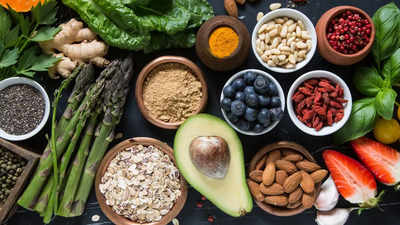Trending
5 healthy foods that are secretly causing weight gain
Certain healthy foods like nuts, avocados, granola, smoothies, and dried fruits can contribute to weight gain when eaten excessively. Despite being nutrient-dense and beneficial for health, they are also high in calories. Practicing portion control and mindful eating helps in enjoying these foods without risking unwanted weight gain.

When it comes to weight management, many people focus on eating healthy foods. However, even some of the healthiest foods can contribute to weight gain if consumed in excess or without proper awareness. While these foods are nutrient-dense and packed with benefits, it’s essential to be mindful of how they are integrated into your diet. Here’s a closer look at 5 healthy foods that could be secretly contributing to weight gain.
Nuts and Nut Butters
Nuts are often hailed as a powerhouse of nutrients, rich in healthy fats, protein, and fibre. While they offer numerous health benefits, including heart health and improved brain function, they are also incredibly calorie-dense. A small handful of nuts can easily pack 150-200 calories, and nut butters, like peanut or almond butter, are even more concentrated.
Overeating nuts or nut butters without accounting for their calorie content can lead to unintentional weight gain. Portion control is essential when incorporating them into your diet. Stick to small servings and balance them with other foods.
Avocados are another superfood known for their heart-healthy monounsaturated fats and high nutrient content. They are rich in fibre, potassium, and essential vitamins, making them a great addition to any diet. However, similar to nuts, avocados are also calorie-dense.
One medium avocado contains around 240 calories. If you frequently add avocados to salads, smoothies, or toast without measuring portion sizes, you may be consuming more calories than you realize, which could contribute to weight gain over time. Moderation is key when enjoying this creamy fruit.
Granola
Granola is often marketed as a health food, full of whole grains, oats, nuts, and seeds. While it can be a source of fibre and healthy fats, granola is also high in calories and added sugars, particularly the store-bought varieties.
A single serving of granola (usually 1/4 cup) can contain 200-300 calories, but many people unknowingly consume much more. The high sugar content can also spike blood sugar levels, leading to hunger and cravings later. Opt for homemade granola with minimal sugar and always measure portions to avoid overindulging.
Smoothies and Juices
Smoothies and juices made from fresh fruits and vegetables can be a great way to pack in nutrients. However, many people unknowingly add excessive amounts of high-calorie ingredients like bananas, peanut butter, yoghurt, and honey, turning a healthy beverage into a calorie bomb.
Additionally, fruit juices, even when freshly made, lack fibre and can cause blood sugar spikes, leading to increased hunger. When making smoothies, focus on adding greens and low-sugar fruits, and limit high-calorie ingredients. Also, avoid fruit-only juices and choose whole fruits instead for fibre benefits.
Dried Fruits
Dried fruits like raisins, dates, and apricots are often seen as a healthy snack, rich in vitamins, minerals, and antioxidants. However, the drying process concentrates the natural sugars and calories in these fruits. For example, a cup of fresh grapes contains about 60 calories, while a cup of raisins has around 400 calories.
The small size of dried fruits also makes it easy to overeat them without realising how many calories you’re consuming. While they are healthy in moderation, be cautious with portion sizes, and combine them with protein or fat to slow digestion and prevent blood sugar spikes.
While these foods are packed with essential nutrients and offer numerous health benefits, it’s easy to overconsume them and unknowingly sabotage weight loss efforts. The key to preventing weight gain from these healthy foods is mindful eating, portion control, and balancing them with other nutrient-dense options. By paying attention to serving sizes and understanding the calorie content of these foods, you can enjoy their benefits without the unwanted side effects of weight gain.
(Image courtesy: Canva)

Nuts and Nut Butters
Nuts are often hailed as a powerhouse of nutrients, rich in healthy fats, protein, and fibre. While they offer numerous health benefits, including heart health and improved brain function, they are also incredibly calorie-dense. A small handful of nuts can easily pack 150-200 calories, and nut butters, like peanut or almond butter, are even more concentrated.
Overeating nuts or nut butters without accounting for their calorie content can lead to unintentional weight gain. Portion control is essential when incorporating them into your diet. Stick to small servings and balance them with other foods.
Avocados
Avocados are another superfood known for their heart-healthy monounsaturated fats and high nutrient content. They are rich in fibre, potassium, and essential vitamins, making them a great addition to any diet. However, similar to nuts, avocados are also calorie-dense.
One medium avocado contains around 240 calories. If you frequently add avocados to salads, smoothies, or toast without measuring portion sizes, you may be consuming more calories than you realize, which could contribute to weight gain over time. Moderation is key when enjoying this creamy fruit.
Granola
Granola is often marketed as a health food, full of whole grains, oats, nuts, and seeds. While it can be a source of fibre and healthy fats, granola is also high in calories and added sugars, particularly the store-bought varieties.
A single serving of granola (usually 1/4 cup) can contain 200-300 calories, but many people unknowingly consume much more. The high sugar content can also spike blood sugar levels, leading to hunger and cravings later. Opt for homemade granola with minimal sugar and always measure portions to avoid overindulging.
Smoothies and Juices
Smoothies and juices made from fresh fruits and vegetables can be a great way to pack in nutrients. However, many people unknowingly add excessive amounts of high-calorie ingredients like bananas, peanut butter, yoghurt, and honey, turning a healthy beverage into a calorie bomb.
Additionally, fruit juices, even when freshly made, lack fibre and can cause blood sugar spikes, leading to increased hunger. When making smoothies, focus on adding greens and low-sugar fruits, and limit high-calorie ingredients. Also, avoid fruit-only juices and choose whole fruits instead for fibre benefits.
Dried Fruits
Dried fruits like raisins, dates, and apricots are often seen as a healthy snack, rich in vitamins, minerals, and antioxidants. However, the drying process concentrates the natural sugars and calories in these fruits. For example, a cup of fresh grapes contains about 60 calories, while a cup of raisins has around 400 calories.
The small size of dried fruits also makes it easy to overeat them without realising how many calories you’re consuming. While they are healthy in moderation, be cautious with portion sizes, and combine them with protein or fat to slow digestion and prevent blood sugar spikes.
While these foods are packed with essential nutrients and offer numerous health benefits, it’s easy to overconsume them and unknowingly sabotage weight loss efforts. The key to preventing weight gain from these healthy foods is mindful eating, portion control, and balancing them with other nutrient-dense options. By paying attention to serving sizes and understanding the calorie content of these foods, you can enjoy their benefits without the unwanted side effects of weight gain.
(Image courtesy: Canva)
End of Article
FOLLOW US ON SOCIAL MEDIA










